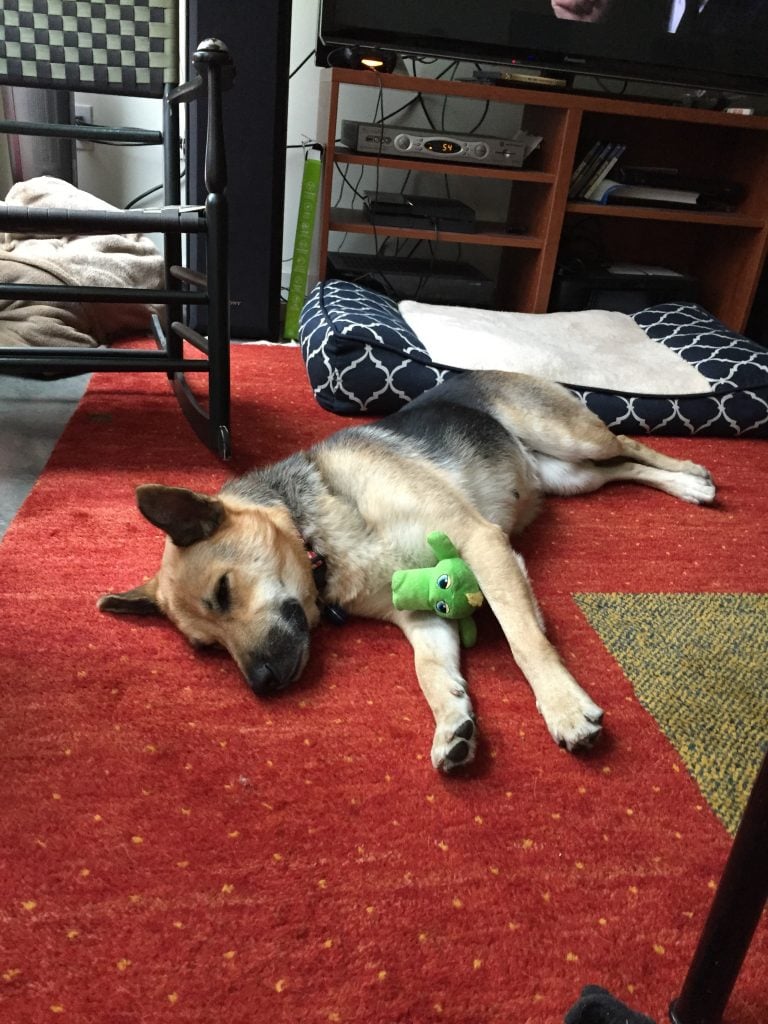It’s a familiar sight to dog owners: the twitching paws, wagging tails, and yipping that signal a happy dream. But suddenly your dog is yelping, snarling, and even screaming in his sleep. Is it really a nightmare? Can dogs have nightmares? If so, how can you help your dog get through it?
I started wondering about dog nightmares when my adopted dog, Lana, began frantically crying and snarling in her sleep. It was much more violent than her usual muffled yips. When she woke, she ran to me and leaned against my legs as if something had terrified her.
I needed to know how to help her. So here’s what I found out about why dogs have bad dreams—and how to keep your canine companion comfortable during one.
What Do Dogs Usually Dream About?
Before we get to the scary stuff, let’s talk about your average dog dream. The brains of dogs and humans are very similar (you knew that, of course!) It’s been proven that our brain waves go through the same stages of activity during sleep. Just like their human counterparts, dogs dream about their memories. They also dream to process the emotions they’ve experienced during the day. Dog dreams are also likely about common doggy activities like chasing, playing and hunting.
What Are Dog Nightmares About?
Because they have long-term memories—they certainly don’t forget the word “bath,” even when they conveniently forget all other commands—researchers are pretty sure that dogs dream about specific events in their life. That brings me back to Lana, my adopted pup.
Though I don’t know much of her history, I can safely assume that Lana has a traumatic past, and that was haunting her dreams. Unlike people, dogs do not have a developed imagination, so it’s unlikely that zombie dogs or Cujo are terrorising your pet. Instead, they are probably dreaming about a past negative experience and reliving it during sleep. Dogs that have been rescued, abandoned or abused are more likely to suffer from nightmares than dogs that have always had a stable home.
How Can I Help My Dog With Nightmares?
First things first—let sleeping dogs lie. A dog that is startled out of a frightening dream is more likely to growl or even bite out of fear. If you feel like you must wake your pup, gently call out their name and wake them without touching them. This keeps everyone safe and comfortable in the aftermath of the bad dream.
If your dog suffers from disrupted sleep, help them by creating a soothing environment for snoozing. In particular, you can:
- Supply a cosy bed: supportive memory foam
is especially easy on the joints.
- Play quiet music, such as classical.
- Use a quality dog crate
to give them a secure sleeping spot.
- Try a pressure wrap for anxiety, such as the popular ThunderShirt
- Use DAP (Dog Appeasing Pheromone) products which mimic the calming scent of a nursing mother dog. DAP products are available as a collar, plug-in diffuser, or room spray and they can reduce your dog’s anxiety—whether it’s related to fireworks, storms, travelling, or separation. A research study published in the Journal of the British Veterinary Association specifically evaluated their use for storm phobia in dogs and found them to be effective
- Let them rest, even if they’re in the throes of a bad dream.
If nightmares are a frequent occurrence, contact your veterinarian. Your vet will be able to diagnose any medical reasons behind the nightmares, and help you both get a good night’s sleep.
Lana’s nightmares, though startling, are infrequent enough that I’m not too concerned. During the day I focus on exercising, playing, and just spending quality time with her, and at night I provide her with her own comfortable sleeping area. By creating safe spaces and happy experiences during the day, I hope to influence her dream world. And if she is woken in the night by a bad dream, at least she’s in her safe, soft bed.
Above All, Relax
If your dog has an occasional nightmare, don’t worry. Just like when you have the occasional bad dream, your pup will wake up and forget it ever happened. You can help them through it by speaking to them in a soothing voice, not startling them awake, and best of all—by creating wonderful new memories during the day. That’s the fun part!
And if you can’t be around as much as you’d like to be for whatever reason and you’d prefer it if your dog has some company while you’re gone, you can find plenty of loving sitter who’d be happy to take care of your dog on Rover.com.




